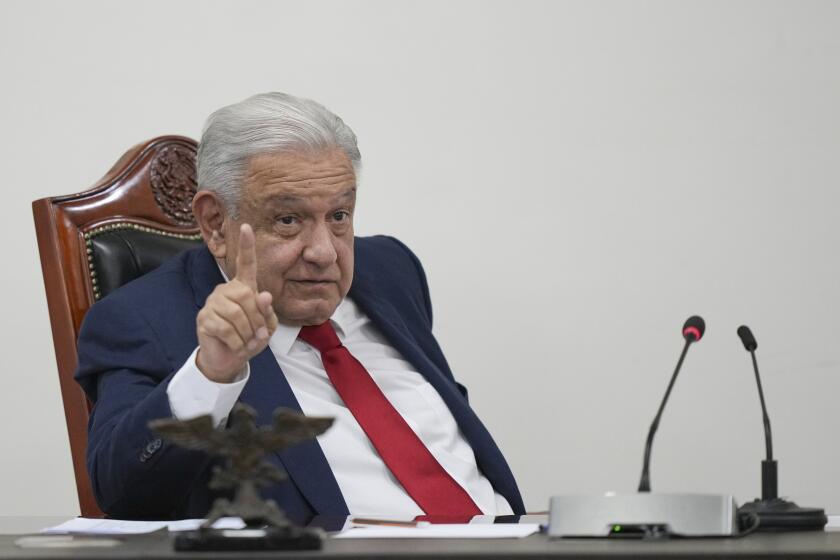The Bill Comes Due on Iran Air 655 : Though Not Obligated, U.S. Should Accept Liability
In the parlance of tort lawyers, strict liability is money in the bank. A defendant’s denial of intent, negligence or culpability means little. Admitting mistakes means even less. The party that did the damage has to appear in court and usually has to pay.
But between nations there are no hard and fast rules on strict liability, and rarely any obligation to face a panel of alien judges. Governments negotiate, barter, make excuses, deny wrongdoings and hide behind mistakes. Compensating the victims of a nation’s tort or crime typically becomes a diplomatic hot potato.
This is now the case with Iran Air Flight 655. One year ago today, 290 people aboard the Airbus plunged to their death in the waters of the Strait of Hormuz. The captain of the U.S. guided-missile cruiser Vincennes, which was battling some small Iranian gunboats, blew the commercial airliner out of the sky. He acted on the mistaken belief that the Airbus was an Iranian F-14 fighter descending to attack.
The Vincennes’ radars had recorded Flight IR-655 ascending in the commercial air corridor. Human error had fed the wrong information to the captain.
The United States claims that the missile firing was a “lawful act of self-defense.” The State Department refuses to concede any legal liability to Iran, and condemns the Iranian authorities for allowing a commercial jet to fly over a warship engaged in battle.
Washington was quick to offer compensation to the victims’ families for humanitarian purposes. It insisted that the payments be made ex gratia --a gift that did not imply any legal obligation--and that they bypass the Iranian government. No way has yet been found to do that.
Several weeks ago, Iran had the gall to sue in the World Court. The Tehran regime wants the United States declared an outlaw and held liable for compensating the Iranian government directly.
Hypocrisy is a way of life with the Iranian authorities. They refused to appear in the World Court 10 years ago when Washington sought the release of American hostages in Tehran. Since then, Iran’s leaders have sponsored international terrorism, spurned the United Nations as the forum for grievances and waged a horrific war with Iraq, attacked neutral shipping and laid mines in the Persian Gulf, and called for the assassination of novelist Salman Rushdie. Now they invoke international law and repair to the World Court to squeeze a fast buck out of Uncle Sam.
As two-faced as Iran’s mullahs are, President Bush faces an excruciating decision: Should the United States defend itself in the World Court or simply ignore Iran’s politically charged claims?
An American no-show would grant Iran a gratuitous propaganda victory and denigrate the authority of the World Court. Most likely the State Department could get the case thrown out on procedural grounds.
The United States is in a strong position to easily hold its own against Iran. Washington apologized, offered to compensate the victims, investigated the incident thoroughly and cooperated fully with the International Civil Aviation Organization, which concluded that the Vincennes’ action did not violate aviation conventions.
Nevertheless, Bush might spurn the World Court. Ever since the Reagan Administration walked out of the Hague to protest Nicaragua’s claim of illegality in U.S. aid to the Contras, the State Department has opposed submitting to the World Court any case that involves the use of military force. The last thing Bush wants is for the World Court to muck around again in the rules governing warfare, rendering an adverse decision that would further hamper the flexible use of U.S. military might overseas.
Many members of Congress have opposed unconditional payments to compensate for the downing of Iran Air 655. Going to the World Court would earn Bush no favor on Capitol Hill and even less from an American public that continues to be repelled by Iran’s lawless behavior.
Still, the government is setting a bad precedent in its retreat behind a wall of excuses to avoid any legal responsibility for the downing of Flight 655. If the plane in fact had been a diving F-14, then destroying it in self-defense would have been perfectly legal. But if the fear of an attack proves illusory, and innocent lives on a commercial airliner are lost, then it is in the interest of the United States to admit some legal responsibility up front and pay fair compensation to the injured government and victims, even if the government is as lawless as Iran’s.
That, after all, is the standard the United States has held other governments to for 40 years. Washington has repeatedly claimed that the shooting down of military or commercial aircraft, or attacks on U.S. Navy vessels on the open seas, are violations of international law, and that the responsible state must pay reparations directly to the injured government. Because so many Americans fly on foreign carriers, the United States is typically at the forefront of condemning attacks on any commercial airliners.
Washington has not excused Iraq from legal liability for firing (presumably by accident) an Exocet missile at the U.S. frigate Stark in the Persian Gulf two years ago, killing 37 servicemen. Iraq recently agreed to pay $27.3 million to the U.S. government on behalf of the victims’ families. The State Department had said that such payments would not be regarded as ex gratia-- made without legal obligation.
If an American or European commercial airliner had been mistakenly shot down over the Persian Gulf by an Iranian gunboat captain who believed he was under attack by U.S. fighter aircraft, Washington would have been the first to label the action a violation of international law and demand that Iran accept responsibility and pay reparations.
A standard of strict liability, reasonably applied, may gnaw at the U.S. Navy’s pride. But it will enhance the safety of commercial air travel and the credibility of acts of self-defense.
More to Read
Sign up for Essential California
The most important California stories and recommendations in your inbox every morning.
You may occasionally receive promotional content from the Los Angeles Times.










